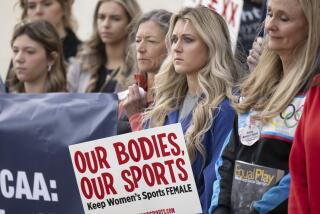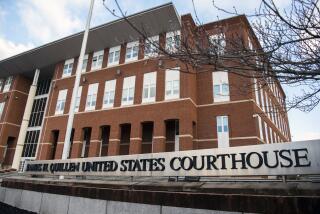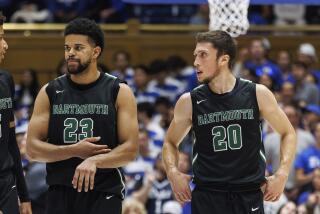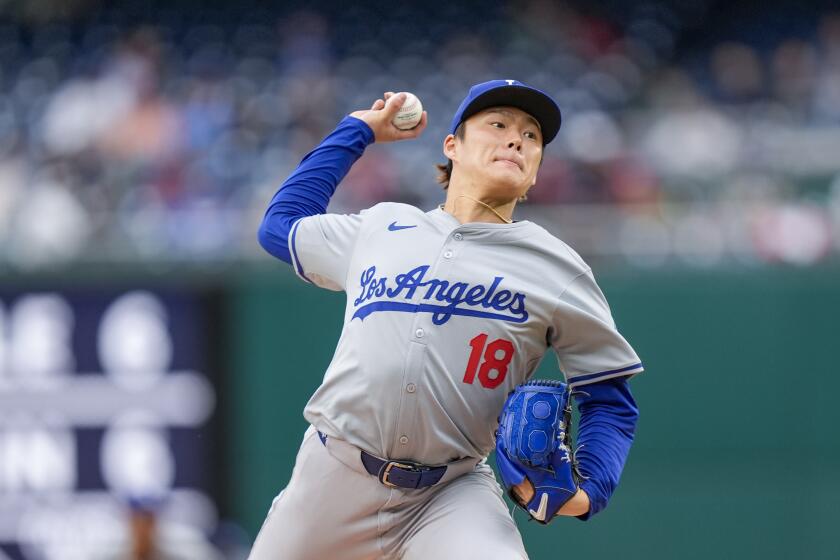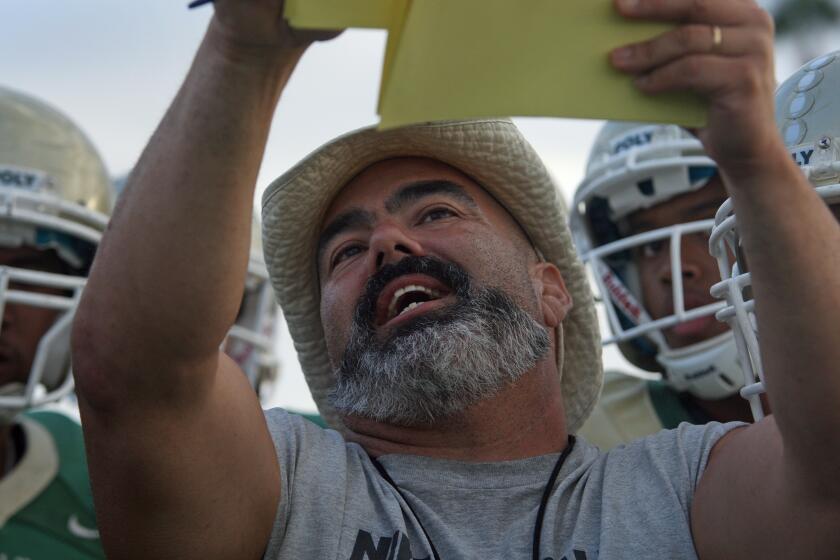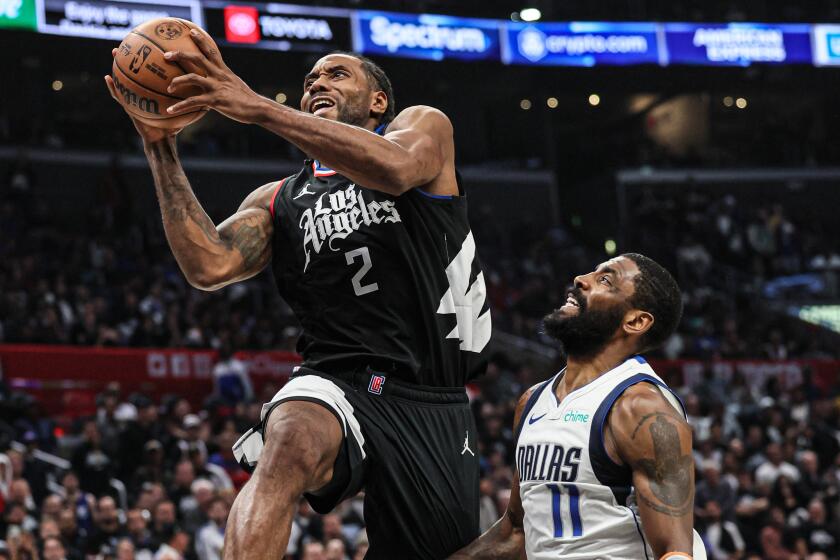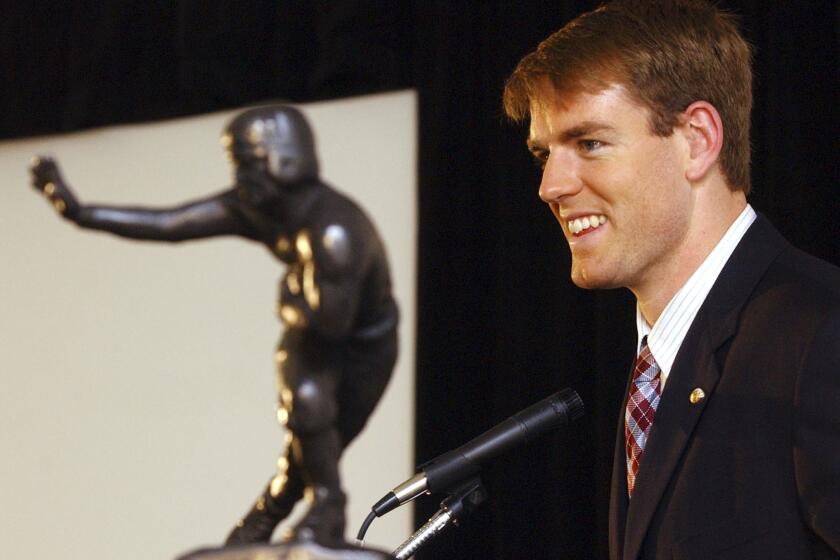NCAA takes a major hit as federal judge rules in athlete amateur case
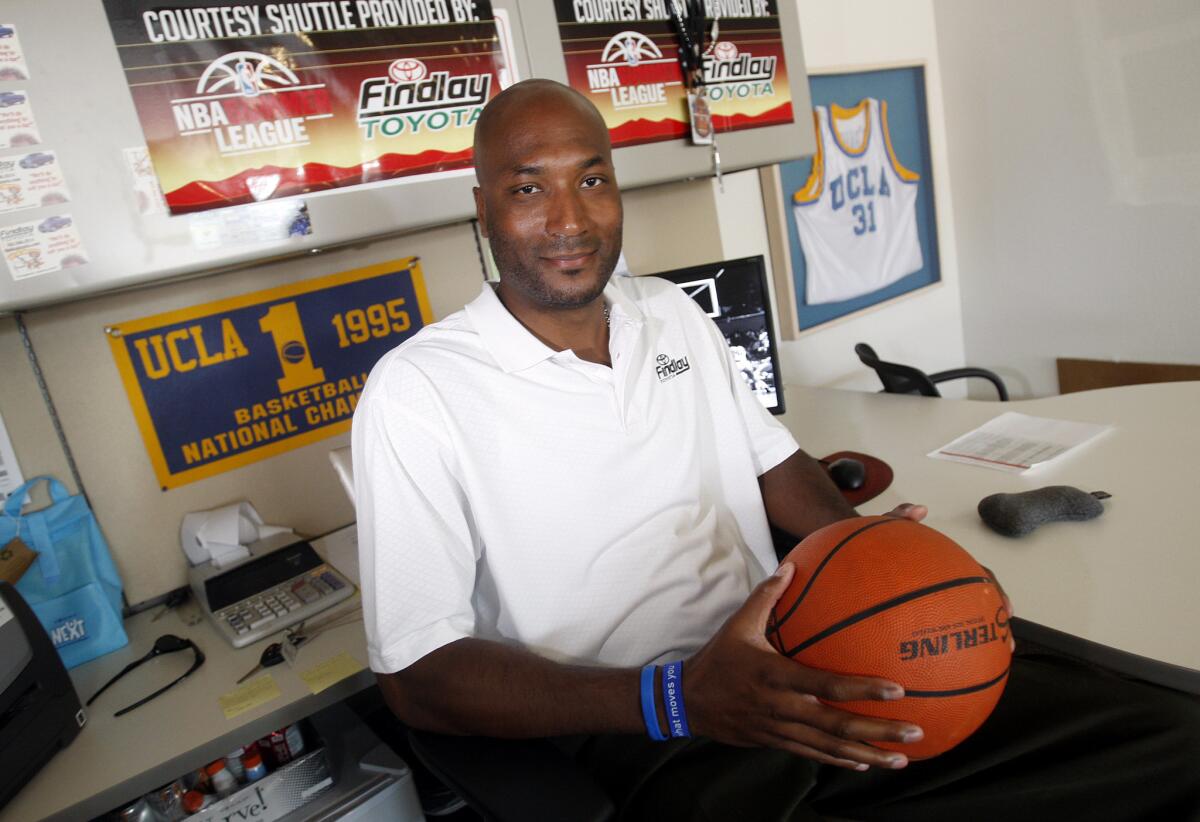
Former UCLA basketball star Ed O’Bannon in his office in Henderson, Nev., in 2010. A federal judge ruled in O’Bannon’s favor Friday in a landmark suit against the NCAA over its amateurism rules.
A federal judge here dealt a major blow Friday to the NCAA and its long-held value of amateurism, ruling in an antitrust case that the association’s policies banning athletes from profiting from their own names, images and likenesses “unreasonably restrain trade.”
U.S. District Judge Claudia Wilken ruled five weeks after the conclusion of a bench trial in the case brought by former UCLA basketball star Ed O’Bannon on behalf of Division I men’s basketball and football players.
The NCAA had argued the “procompetitive benefits” of prohibiting athletes from sharing in the multibillion-dollar collegiate sports industry justified the long-held policies, but Wilken disagreed.
“After considering all of the testimony, documentary evidence and arguments of counsel presented during and after trial, the court finds that the challenged NCAA rules unreasonably restrain trade in the market for certain educational and athletic opportunities offered by NCAA Division I schools,” Wilken wrote in the 99-page ruling.
“The procompetitive justifications that the NCAA offers do not justify this restraint and could be achieved through less-restrictive means. The court … will enter as a remedy a permanent injunction prohibiting certain overly restrictive restraints.”
Wilken’s ruling does not order revenue sharing but her injunction lifts the NCAA restriction that has barred Division I schools from doing so, and permits member schools and conferences to provide to athletes “the full cost of attendance” and offer to deposit “a limited share of licensing revenue in trust” to athletes. That amount can be capped at no less than $5,000 per player annually until they graduate or leave school.
Currently, schools can offer tuition, books, room and board, but scholarships are capped and do not cover the full cost of going to school.
Wilken stopped short, however, of lifting a ban on commercial endorsement by student athletes, saying that would “undermine the efforts of both the NCAA and its member schools to protect against the ‘commercial exploitation’ of student-athletes.”
In a statement, the NCAA’s chief legal officer, Donald Remy, said: “We disagree with the court’s decision that NCAA rules violate antitrust laws. We note that the court’s decision sets limits on compensation, but are reviewing the full decision and will provide further comment later.”
Referring to action Thursday allowing the NCAA’s five wealthiest football conferences to pass legislation without the approval of the full NCAA membership, Remy added, “As evidenced by yesterday’s Board of Directors action, the NCAA is committed to fully supporting student-athletes.”
William Isaacson, the co-lead attorney for the plaintiffs, said, “This is a big win for college athletes because now schools would be permitted to provide fair and reasonable sharing of revenue.
“What her decision points out is that amateurism ended some time ago,” he said. “This decision doesn’t end amateurism, it just points out the facts.”
Isaacson said that even if all schools capped the trust funds at $5,000 annually, that would amount to in excess of $300 million for Division I basketball and football players over a four-year span.
The ruling permits them to share in burgeoning industry profits, he noted, though the amounts per athlete may seem modest.
“The clients will never notice this themselves financially. For them this is about change for the future and they’ve accomplished that,” he said.
Plaintiffs — 20 current and former student-athletes — filed the case a little more than five years ago. They alleged the NCAA violates antitrust law by colluding with its member colleges and conferences in a scheme that amounts to price-fixing and refusal to deal. The case sought an end to the ban on revenue sharing from their name, image and likeness rights for video games, live television broadcasts, rebroadcasts, advertisements and archival footage.
The NCAA countered it is a collaborative joint venture that has made rules in the interest of collegiate sports, thereby maintaining core values key to its fan base of amateurism and an integrated experience of academics and athletics. But Wilken found that allowing student-athletes a limited piece of the pie would not harm those goals.
She noted the rules of amateurism “have changed numerous times” since the association enacted its first bylaws in 1906. And she pointed out banning revenue sharing has done little if anything to improve academic outcomes.
The injunction will not be stayed pending appeal of the ruling, Wilken wrote, but her order will not take effect until the start of the next recruiting cycle.
USC Athletic Director Pat Haden said the ruling was expected.
“This will still play out for some time and while it does, USC will remain committed to doing as much as we possibly can for our student-athletes within the NCAA rules,” Haden said in a statement.
Jim Lackritz, a faculty co-founder of the sports MBA program at San Diego State, calling the ruling “great for the student-athletes.” But he said it could widen the competitive gap between the haves and have-nots in college sports, with only the wealthiest conferences and teams able to afford sizable stipends. That means only the best teams will get top high school recruits.
“The cream of the crop athletes won’t even consider mid-level school,” Lackritz said. “You’re now almost creating a separate division.”
The week has been a difficult one for the NCAA. Faced with the potential defection of some of its biggest schools, the association’s board of directors voted Thursday to grant the five largest — and wealthiest — football conferences more say in policies that govern college sports.
The so-called “Power Five” — the Pac-12, Southeastern Conference, Big Ten, Big 12 and Atlantic Coast Conference — now wield more than one-third of the vote on a newly created NCAA council.
NCAA President Mark Emmert called the change “a compromise on all sides that will better serve our members.”
Wilken is also scheduled to hear lawsuits led by Martin Jenkins, a Clemson football player who claims the NCAA illegally restricts players’ earning power, and Shawne Alston, a former West Virginia running back who is fighting the cap on athletic scholarships.
“The bigger issues have yet to be determined,” said Matt Mitten, director of the National Sports Law Institute at Marquette University. “And this judge has indicated she will be fairly sympathetic to student-athlete claims.”
Romney reported from Oakland, Wharton from Los Angeles.
Follow Lee Romney on Twitter @leeromney
Follow David Wharton on Twitter @latimeswharton
More to Read
Get our high school sports newsletter
Prep Rally is devoted to the SoCal high school sports experience, bringing you scores, stories and a behind-the-scenes look at what makes prep sports so popular.
You may occasionally receive promotional content from the Los Angeles Times.
